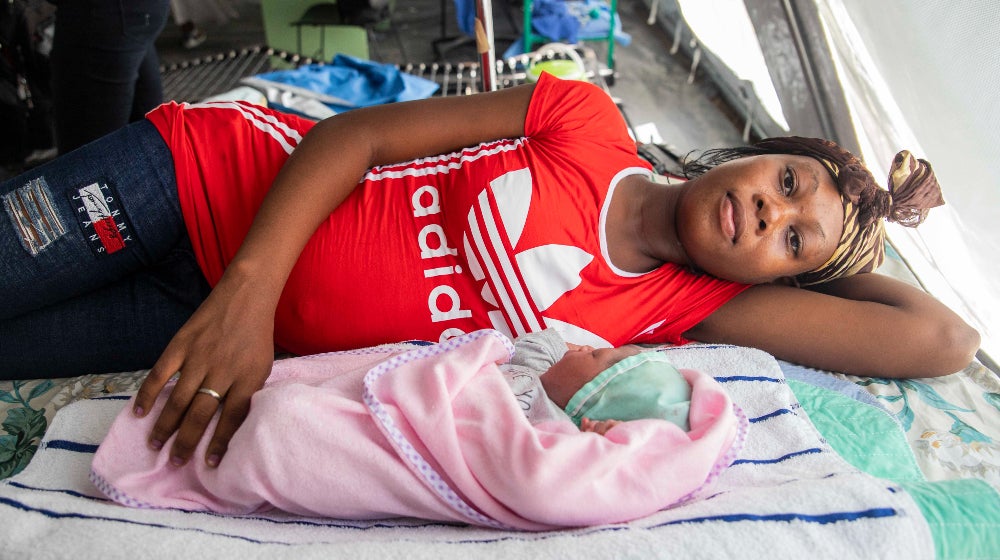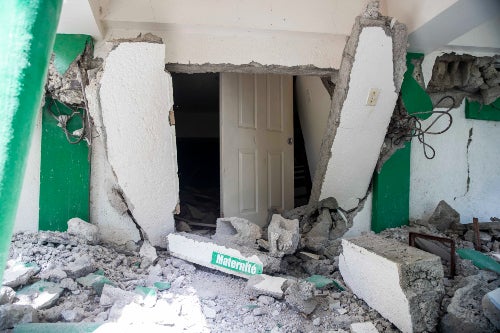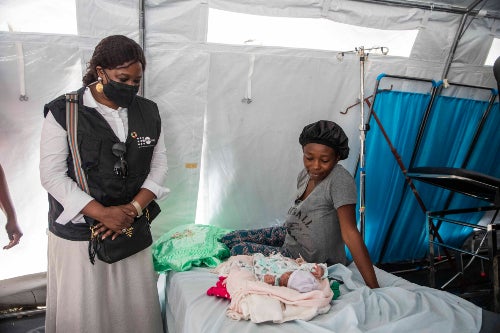
L’ASILE, Nippes department, Haiti – On the grounds of the Hôpital de Référence Communautaire de l’Asile in the southwest, Désir Murielle rests in a tent steps from hunks of twisted, fissured metal that once was the hospital’s maternity wing with her newborn son. “He was born this morning, and he is called Yves,” said Ms. Murielle.
Baby Yves would have been born in that now-collapsed ward if not for the 7.2 magnitude earthquake of August 14. The quake killed more than 2,200 people, injured more than 12,000, and destroyed essential infrastructure including hospitals, roads, and bridges.
“There were two women lying in the post-partum ward of the maternity wing when the building collapsed,” recalled Eludernme, a senior nurse and midwife. “You can still see the beds crushed beneath concrete. Very fortunately they felt the tremor and escaped.”

Help for the hospitals
The hospital is one of 18 damaged or destroyed health facilities that UNFPA is supporting with reproductive health services. Next month, UNFPA will deploy a fully-fledged mobile emergency obstetric and newborn care unit to handle deliveries and obstetric complications.
In the first two months following the earthquake in Haiti, UNFPA provided safe delivery care in 1,540 birth in health centers and hospitals. The quake affected more than 72,000 pregnant women, 15,000 of whom will give birth in the next three months. Of these women, 2,250 will suffer obstetric complications that will require care such as Caesarean sections. UNFPA deployed 30 midwives to Haiti and 60 percent are in quake-impacted areas.
On the morning of Yves’s birth, another took place during the visit of UNFPA Deputy Executive Director Diene Keita. “It was moving that this baby was born in the compound of this hospital that was razed to the ground by the earthquake,” said Keita. She added that the efforts of multiple United Nations agencies made it possible for “the miracle of this baby being born.”

Reconstruction and recovery
While the humanitarian response to the earthquake remains ongoing, attention is turning to longer-term reconstruction projects. Hospitals, homes, roads, and other infrastructure are necessary for communities to recover.
The Haitian government is working to raise the $2 billion needed for the reconstruction and recovery effort.
Combating gender-based violence is part of that recovery effort. “Women and girls are more vulnerable after an earthquake because they are no longer living at home but alongside strangers, and they don’t have access to bathroom facilities,” explained Taina Camy, who works on gender-based violence issues at UNFPA. “More than two months after the earthquake, we are able to provide more services to women and girls in need, especially at the local level.”
Back in the maternity tent in L’Asile, Ms. Murielle and other mothers welcome another arrival. And one day, in the not-too-distant future, the hospital itself will be given a new life of its own.